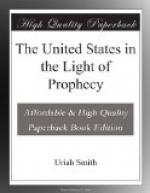And what is the profession of this government in these respects? That great instrument which our forefathers set forth as their bill of rights, the Declaration of Independence, contains these words: “We hold these truths to be self-evident, that all men are created equal, that they are endowed by their Creator with certain unalienable rights; that among these are life, liberty, and the pursuit of hapiness.” And in Article IV, Sec. 4, of the Constitution of the United States, we find these words: “The United States shall guaranty to every State in this Union a republican form of government.” A republican form of government is one in which the power rests with the people, and the whole machinery of government is worked by representatives elected by them. And here, again, we see the fitness between the symbol and the government which is symbolized; for the horns of the two-horned beast have no crowns upon them as do the horns of the dragon and leopard beast, showing that the government which it represents cannot be monarchical, but is one in which the power is vested in the hands of the people.
This is a sufficient guarantee of civil liberty. What is said respecting religious freedom? In Art. VI of the Constitution, we read: “No religious test shall ever be required as a qualification to any office or public trust under the United States.” In Art. I of Amendments of the Constitution, we read: “Congress shall make no law respecting an establishment of religion, or prohibiting the free exercise thereof.”
In reply to questions as to the design of the Constitution from the committee of a Baptist society in Virginia, Geo. Washington wrote, Aug. 4, 1789, as follows:—
“If I had the least idea of any difficulty resulting from the Constitution adopted by the Convention, of which I had the honor to be President when it was formed, so as to endanger the rights of any religious denomination, then I never should have attached my name to that instrument. If I had any idea that the general government was so administered that the liberty of conscience was endangered, I pray you be assured that no man would be more willing than myself to revise and alter that part of it, so as to avoid all religious persecutions. You can, without doubt, remember that I have often expressed my opinion, that every man who conducts himself as a good citizen is accountable alone to God for his religious faith, and should be protected in worshiping God according to the dictates of his own conscience.”




